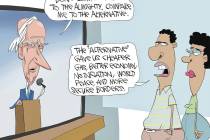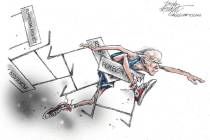I seek truth, not facts
One thing we've always known in the newspaper business -- or ought to have known -- is that we're not necessarily being truthful by being factual.
Here's what I mean: It would be factual to write that George W. Bush says America does not torture. It's a fact that he says that. But it's not true that America doesn't torture.
Our news articles have tended by treasured professional rules of accuracy and fairness to stick with the factual and leave the greater pursuit of elusive truth to the columnists, editorial writers and concerned citizenry. It's been a time-honored reporting style to maintain utter neutrality in news articles, this having been considered virtue.
So there's this guy, Ron Fournier. He cut his journalistic teeth in Little Rock, first with the Arkansas Democrat, then the local bureau of The Associated Press. Then he went to Washington in 1993 to cover Bill Clinton for the AP. He was the classic just-the-facts reporter, devoted to getting out there first with the facts about what the politicians said and did.
Now he's evolved, which happens with smart people.
He's become the acting bureau chief for the AP in Washington. And he's shaking things up.
He says just-the-facts reporting -- long his craft and very essence -- hasn't adequately served truth. He says that, with newspapers downsizing and people inundated with noisy information from myriad directions, the AP's reporters need to "cut through the clutter" to engage in what he calls accountability journalism.
So he's advocating that AP reporters sometimes, where appropriate, augment the reporting of the fact of what a politician said with an often-unattributed correction or amplification to glean the truth from what the politician said.
For a mere example, and the example is all mine: A reporter might quote the president as saying, "You're doing a great job, Brownie." But then the reporter, if working in Fournier's new world, might write something contrary from his own independent, honest and personally expressed professional observation.
The reporter could write, "Despite the president's defensive praise for his appointee, FEMA, under Brown's direction, has thus far been slow, even near-invisible, in getting urgent services to desperate people."
Surely you see the arising conflict. You can already hear someone saying "slippery slope."
The issue will be, as always, where the line is drawn. Was the truth of the reporter's contrary observation in that recent example so universally evident that it was appropriate, even compelling? I suspect so. But the line is never drawn in one clear, stationary place. In the news business it is drawn according to situations and circumstances and necessarily by the seats or our pants.
If Barack Obama said that John McCain had talked of a hundred-year war in Iraq, might the AP reporter be permitted to correct Obama arbitrarily and unilaterally by writing, with this new reporting license, that McCain had talked of a long-standing American military presence in Iraq, as in South Korea and in Europe after World War II, but not active war?
Fournier is on to something important about a new and better journalism in this greater pursuit of truth in an uncommonly cluttered modern environment. But you can't possibly draw a definitive line. All you can do is decide case-by-case with the ever-fluid situational judgment of a capable reporter and his or her capable editor.
The biggest problem wouldn't be with the elite professionals of The Associated Press. It would be with the local-yokel imitators, exercising a truth-telling license for which they will be personally and professionally ill-equipped. The first time the country weekly's reporter presumes unilaterally and arbitrarily to correct the county sheriff, there's going to be trouble in Hooterville.
I'm just trying to tell you the truth here, whatever the facts.
John Brummett is a columnist for the Arkansas News Bureau in Little Rock. His e-mail address is jbrummett@arkansasnews.com; his telephone number is (501) 374-0699.























